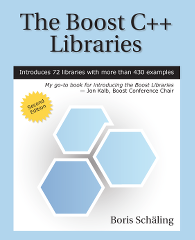
The Boost C++ Libraries
by Boris Schäling. $45.95.
Buy 2nd edition now at Barnes and Noble
Buy 2nd edition now at Amazon.com
German language 2nd edition at Amazon.de
Second Edition Now Available
The second edition of Boris Schäling’s definitive book, The Boost C++ Libraries introduces 72 Boost libraries that provide a wide range of useful capabilities. They help you manage memory and process strings more easily. They provide containers and other data structures that go well beyond what the standard library offers. They make it easy to build platform-independent network applications. Simply put, these 72 libraries greatly expand your C++ toolbox.
The second edition contains more than 430 examples. All examples are as short as possible, but they are complete, so you can compile and run them as is. They show you what the Boost libraries offer and give you a head start on using the libraries in your own applications.
The goal of this book is to increase your efficiency as a C++ developer and to simplify software development with C++. The Boost libraries introduced in this book will help you write less code with fewer bugs and finish projects faster. Your code will be more concise and self-explanatory and more easily adapted when requirements change.
The second edition is based on the Boost libraries 1.55.0 and 1.56.0 with the latter version having been released in August 2014. The examples are based on C++11 and have been tested with Visual Studio 2013, GCC 4.8 and Clang 3.3 on various platforms. For Boost libraries that were incorporated into the C++11 standard library, differences between Boost and the standard library are highlighted.
The Boost libraries are one of the most important and influential open source C++ libraries. Their source code is available under a permissive free software license. Several Boost libraries have been incorporated into the C++11 standard library. The Boost libraries are developed and supported by the Boost community – a worldwide developer community with a strong interest in pushing C++ boundaries further.
German Language Edition Now Available
There is now a German language version of the 2nd edition, Die Boost C++ Bibliotheken, which is available on Amazon.de and also on Amazon.com.
Inside the Book
The Boost C++ Libraries is current through version 1.56.0 (August, 2014) of the Boost C++ libraries, and all of the more than 430 examples have been tested with that version of the libraries.
The book introduces the following 72 libraries from Boost: Accumulators, Algorithm, Any, Array, Asio, Assign, Atomic, Bimap, Bind, Chrono, CircularBuffer, CompressedPair, Container, Conversion, Coroutine, DateTime, DynamicBitset, EnableIf, Exception, Filesystem, Flyweight, Foreach, Format, Function, Fusion, Graph, Heap, Integer, Interprocess, Intrusive, IOStreams, Lambda, LexicalCast, Lockfree, Log, MinMax, MPI, MetaStateMachine, MultiArray, MultiIndex, NumericConversion, Operators, Optional, Parameter, Phoenix, Pool, ProgramOptions, PropertyTree, PointerContainer, Random, Range, Ref, Regex, ScopeExit, Serialization, Signals2, SmartPointers, Spirit, StringAlgorithms, Swap, System, Thread, Timer, Tokenizer, Tribool, Tuple, TypeTraits, Unordered, Utility, Uuid, Variant, and Xpressive.
About the Author
Boris Schäling is an active member of the Boost C++ community. He is a regular speaker at C++Now (formerly known as BoostCon) and Meeting C++, and he has given talks on various Boost libraries. He acted as the Boost administrator for the Google Summer of Code program and was a Boost C++ representative at the Google Summer of Code Mentor Summit 2010. He is the driving force behind creating a C++ process management library in Boost and proposes improvements and extensions to various Boost libraries from time to time.
Schäling’s main interest in C++ is improving efficiency in software development projects and making C++ easier to use. He has worked as a consultant and trainer, helping companies reach these goals using the Boost C++ Libraries. He has extensive international experience and is currently living in Amsterdam, the Netherlands.
What are They Saying?
“The most helpful introduction to the Boost C++ libraries I’ve seen. I recommend it.”
— Robert Ramey, Boost C++ developer
“My go-to book for introducing the Boost Libraries.”
— Jon Kalb, Boost Conference Chair
